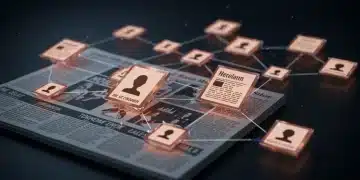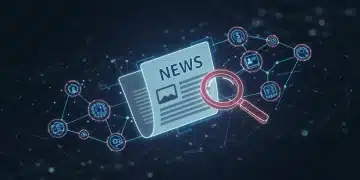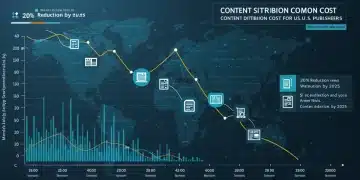Tokenized Journalism: Decentralized Fact-Checking Beyond 2025
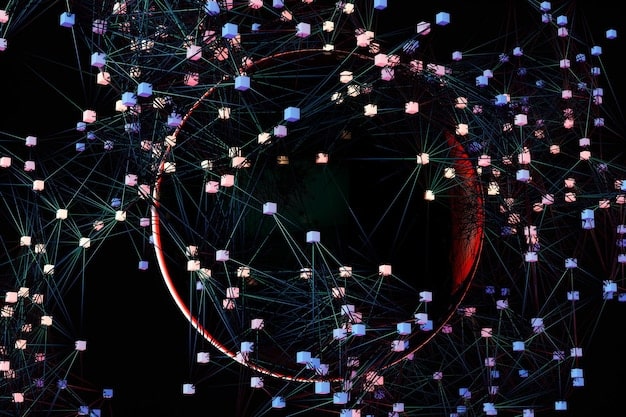
Tokenized journalism aims to revolutionize fact-checking through decentralized systems, leveraging blockchain technology to provide transparent, verifiable, and community-driven content verification, potentially reshaping how we consume and trust news by 2025.
As we look toward 2025, the landscape of journalism is poised for a significant transformation, driven by the rise of tokenized journalism. This innovative approach leverages blockchain technology to decentralize fact-checking processes, enhance transparency, and foster greater trust in media.
The Dawn of Tokenized Journalism
Tokenized journalism represents a paradigm shift in how news is produced, verified, and consumed. By leveraging blockchain and cryptographic tokens, this new model aims to address the issues of misinformation, censorship, and lack of transparency that plague traditional media.
Decentralized fact-checking is at the heart of this revolution, promising to empower communities to collectively verify information and hold media outlets accountable. This approach could lead to a more reliable and trustworthy news ecosystem.
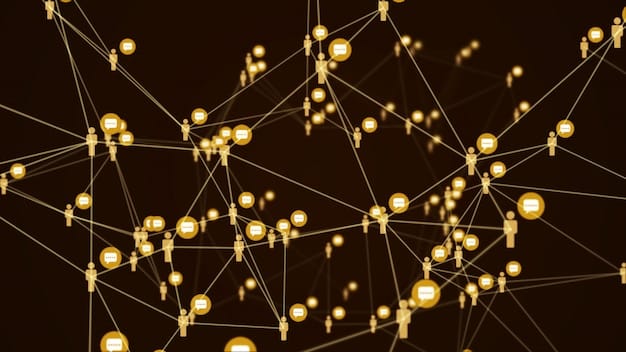
Understanding the Basics of Tokenization
Tokenization involves representing an asset or right as a digital token on a blockchain. In the context of journalism, these tokens can be used to incentivize accurate reporting, reward fact-checkers, and grant readers a stake in the media they consume.
By creating a token economy around journalism, it becomes possible to align the interests of all stakeholders and foster a more collaborative and transparent news environment.
- Incentivizing Accuracy: Tokens can reward journalists for producing high-quality, factual content.
- Empowering Fact-Checkers: Tokens can compensate individuals who contribute to verifying information.
- Engaging Readers: Tokens can give readers a say in the editorial direction of news organizations.
Tokenization, when applied correctly, can increase trust in media and improve the quality of journalism.
How Decentralized Fact-Checking Works
Decentralized fact-checking utilizes distributed ledger technology to create a collaborative and transparent verification process. Unlike traditional models, where a single entity is responsible for fact-checking, decentralized systems leverage the collective intelligence of a community.
This approach aims to reduce bias, increase accuracy, and provide a more comprehensive assessment of the truthfulness of news articles.
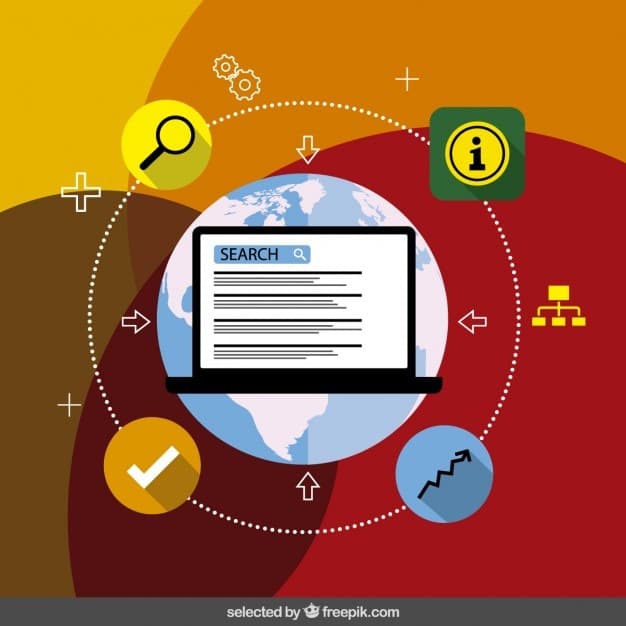
The Role of Blockchain Technology
Blockchain technology is essential for decentralized fact-checking, providing a secure and immutable record of all verification activities. Every fact-check is recorded on the blockchain, making it transparent and auditable.
This transparency is crucial for building trust in the fact-checking process and preventing manipulation or censorship.
- Immutable Records: Blockchain ensures that fact-checking records cannot be altered or deleted.
- Transparency: All verification activities are visible to the public.
- Security: Blockchain’s cryptographic security protects against tampering and fraud.
Blockchain provides a robust infrastructure for verifying and validating information in a decentralized manner.
Challenges and Opportunities
While tokenized journalism and decentralized fact-checking hold great promise, they also face several challenges. Overcoming these obstacles will be essential for realizing the full potential of these innovations.
There are opportunities in incentivizing greater participation but also risks related to scalability and governance.
Scalability and Adoption
One of the biggest challenges is scaling decentralized fact-checking systems to handle the vast amount of information produced daily. Traditional blockchain networks can be slow and expensive, making it difficult to verify news articles in real-time.
Adoption also presents a hurdle. Journalists, fact-checkers, and readers need to embrace tokenized systems for them to have a meaningful impact.
Governance and Bias
Decentralized systems need effective governance mechanisms to prevent abuse and ensure fairness. Without proper oversight, these systems could be vulnerable to manipulation or capture by special interests.
Bias is also a concern. If the community of fact-checkers is not diverse, the verification process could be skewed, reflecting the perspectives of a narrow group.
- Establishing Clear Rules: Governance protocols must be well-defined and transparent.
- Ensuring Diversity: Efforts should be made to include a wide range of perspectives in the fact-checking process.
- Combating Manipulation: Measures must be in place to detect and prevent malicious actors from controlling the system.
Proper governance and inclusivity are critical for preventing abuse and ensuring fairness.
The Projected Landscape by 2025
By 2025, we can expect to see significant advancements in tokenized journalism and decentralized fact-checking. These systems will likely become more sophisticated, user-friendly, and integrated into the mainstream media landscape.
The projected landscape includes greater collaboration between traditional media outlets and decentralized platforms.
Increased Collaboration
Traditional media outlets may begin to partner with decentralized platforms to enhance their fact-checking processes and improve their credibility. This collaboration could take various forms, such as integrating blockchain-based verification tools into their workflows or launching joint initiatives to combat misinformation.
These partnerships could help bridge the gap between traditional journalism and the emerging world of tokenized media.
Enhanced User Experience
As decentralized fact-checking systems mature, we can expect to see improvements in their user experience. These systems will likely become easier to use, more accessible, and more integrated into the platforms and applications people use daily.
A seamless user experience will be essential for driving adoption and making decentralized fact-checking a mainstream activity.
Improved user experience could include things like browser extensions, mobile apps, and integration with social media platforms.
Potential Economic Models
Tokenized journalism is paving the way for innovative economic models that reshape how news is funded and consumed. These models have the potential to realign incentives, rewarding quality journalism and fostering a more sustainable media ecosystem.
Potential economic models include things like micro-payments, token curation, and decentralized advertising.
Micro-Payments
Micro-payments allow readers to pay for individual articles or content pieces, rather than subscribing to entire publications. This model enables readers to support the journalism they value and encourages creators to produce high-quality content.
Micro-payments also decrease the barrier to entry for smaller news organizations.
Micro-payments can be a direct source of revenue for journalists and publishers.
Token Curation
Token curation involves using tokens to highlight worthwhile content and reward curators for discovering and promoting quality journalism. This model can help filter out misinformation and surface reliable news sources.
Curation is often done by a community of users, which helps decentralize the overall process.
Token curation serves as an alternative to traditional methods of content discovery and promotion.
Ethical Considerations
The rise of tokenized journalism and decentralized fact-checking raises important ethical considerations. Addressing these concerns will be crucial for ensuring that these innovations are used responsibly and ethically.
Ethical considerations include things like transparency, fairness, and accountability.
Combating Disinformation
Decentralized fact-checking systems must be designed to effectively combat disinformation and prevent the spread of false information. These systems should be transparent, auditable, and resistant to manipulation.
Combating disinformation involves using advanced technologies and collaborative approaches.
Addressing disinformation is essential for building trust in media and protecting democratic institutions.
Protecting Privacy
Tokenized journalism systems must respect user privacy and protect personal data. These systems should be designed to minimize data collection and ensure that users have control over their information.
Protecting user privacy involves implementing strict security measures and adhering to privacy regulations.
Maintaining user privacy is vital for fostering trust and encouraging participation in tokenized media.
| Key Point | Brief Description |
|---|---|
| 💡 Tokenization | Representing journalistic assets as digital tokens. |
| 🔗 Decentralization | Distributing fact-checking among a community. |
| 🛡️ Blockchain | Securing fact-checking data immutably. |
| ⚖️ Ethics | Maintaining transparency and protecting privacy. |
FAQ
▼
Tokenized journalism is a novel approach to publishing and content verification that uses blockchain technology and cryptographic tokens. This system aims to decentralize the media landscape by rewarding accurate reporting and incentivizing fact-checking.
▼
Decentralized fact-checking involves using a distributed network (like a blockchain) to verify the truthfulness of information. Instead of relying on a single authority, multiple participants evaluate content, and the consensus determines its accuracy.
▼
Tokenizing journalism provides several benefits, including enhanced transparency, increased trust, and new economic models for content creation. It also allows for greater community involvement in the verification process.
▼
Tokenized journalism faces challenges such as scalability, the potential for manipulation, and the need for effective governance mechanisms. Overcoming these hurdles is essential for widespread adoption.
▼
By 2025, fact-checking is expected to become more decentralized, automated, and integrated with AI technologies. Tokenized systems will likely play a key role, incentivizing accuracy and rewarding community participation in content verification.
Conclusion
The evolution of tokenized journalism by 2025 promises to reshape how we consume and trust news. Decentralized fact-checking systems hold the potential to increase transparency, reduce bias, and foster a more reliable media landscape. While challenges remain, the opportunities for innovation and positive change are significant.
